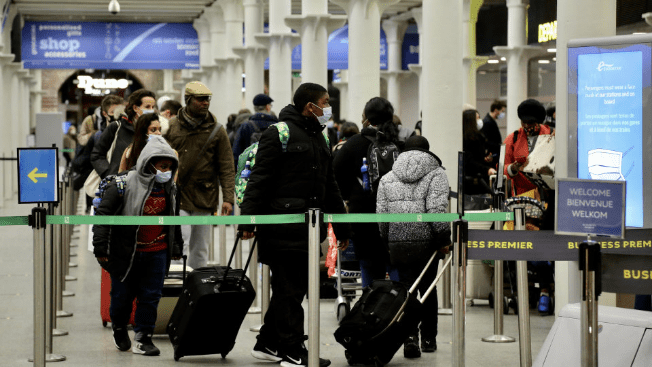
European countries banned travel from the UK on Sunday while the World Health Organization (WHO) called for stronger containment measures as the British government warned that a highly infectious new strain of the virus was “out of control”.
As the WHO urged its European members to beef up measures against a new variant of COVID-19 circulating in Britain, France blocked people and goods crossing the Channel while Germany, Ireland, Italy, Austria, Romania, The Netherlands and Belgium said they were moving to block air travel.
A German government source said the restriction could be adopted by the entire 27-member European Union and that countries were also discussing a joint response over sea, road and rail links with Britain.
Despite growing concerns about the new strain, European Union experts believe it will not impact the effectiveness of existing vaccines, Germany’s Health Minister said.
“According to everything we know so far,” the new strain “has no impact on the vaccines”, which remain “just as effective”, Jens Spahn told public broadcaster ZDF, citing “talks between experts at European authorities”.
France’s ban on all but unaccompanied freight arriving from Britain is especially painful, as companies are scrambling to shift merchandise with days to go until Britain finally quits EU trade structures in the wake of Brexit.
But “flows of people or goods towards the UK will not be affected,” Paris said in a statement.
Rome and Berlin said on Sunday they would both be suspending flights to and from Britain from midnight. Dublin said it would suspend air links with Britain for “at least” 48 hours.
The Netherlands imposed a ban on UK flights from 6 am (0500 GMT) on Sunday and Belgium said it would follow suit from midnight with a ban on planes and trains from the UK.
Alarm bells were ringing across Europe — which last week became the first region in the world to pass 500,000 deaths from Covid-19 since the pandemic broke out a year ago — after it appeared that a new, even more infectious strain of the virus was raging in parts of Britain.
Austria’s health ministry told the APA news agency that it would also impose a flight ban, the details of which were still being worked out.
A spokeswoman for WHO Europe told AFP that “across Europe, where transmission is intense and widespread, countries need to redouble their control and prevention approaches.”
Romania also said it had banned all flights to and from the UK for two weeks starting Monday afternoon.
French President Emmanuel Macron, German Chancellor Angela Merkel, and EU chiefs Ursula von der Leyen and Charles Michel held a conference call on Sunday about the matter, Macron’s office said.
British Prime Minister Boris Johnson said the infectiousness of the new strain had forced his hand into imposing a lockdown across much of England over the Christmas period.
“Unfortunately the new strain was out of control. We have got to get it under control,” UK Health Secretary Matt Hancock told Sky News after Johnson U-turned on his previously stated policy of easing containment measures over the festive season.
Scientists first discovered the new variant — which they believe is 70 percent more transmissible — in a patient in September. And Public Health England notified the government on Friday when modelling revealed the full seriousness of the new strain.
But Britain’s Chief Medical Officer, Chris Whitty, pointed out that while the new strain was greatly more infectious, “there is no current evidence to suggest (it) causes a higher mortality rate or that it affects vaccines and treatments, although urgent work is underway to confirm this.”
The novel coronavirus has killed at least 1,685,785 people since the outbreak emerged in China last December, according to a tally from official sources compiled by AFP at 1100 GMT on Sunday.
And with the onset of colder winter weather in the northern hemisphere where respiratory diseases flourish, countries are bracing for new waves of COVID-19 with tighter restrictions, despite the economic damage such lockdowns wrought earlier this year.
The Netherlands is under a five-week lockdown until mid-January with schools and all non-essential shops closed to slow a surge in the virus.
Italy also announced a new regime of restrictions until January 6 that included limits on people leaving their homes more than once a day, closing non-essential shops, bars and restaurants and curbs on regional travel.
In Russia, health authorities said that the number of people who have died from the coronavirus has surpassed the 50,000 mark and now stands at 50,858.